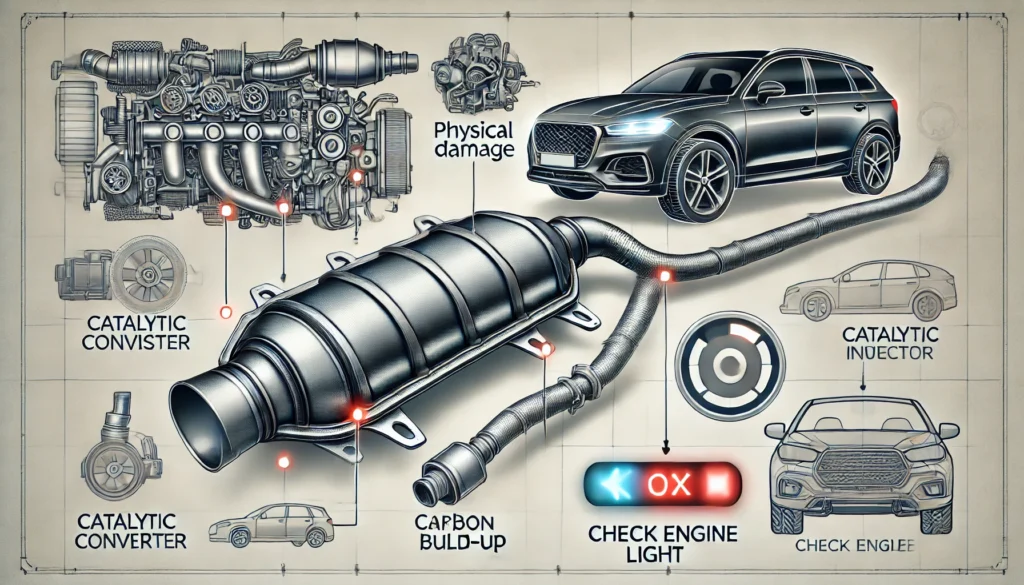When maintaining your vehicle, you might find yourself asking, “Does a catalytic converter go bad?” The answer is yes, catalytic converters can and do go bad over time. This vital component of your vehicle’s exhaust system plays a crucial role in reducing harmful emissions by converting toxic gases into less harmful substances. However, like any other part of your car, it can wear out or fail, leading to a range of issues that could affect your vehicle’s performance and environmental compliance. In this blog post, we’ll explore why catalytic converters go bad, the signs of a failing converter, and what you can do to address the issue.

Why Do Catalytic Converters Go Bad?
Catalytic converters are designed to last for many years, but several factors can contribute to their premature failure:
- Carbon Build-Up Over time, carbon deposits can accumulate inside the catalytic converter, especially if the engine is not burning fuel efficiently. This build-up can restrict the flow of exhaust gases, leading to a clogged converter and decreased performance.
- Engine Misfires Engine misfires can send unburned fuel into the exhaust system. When this unburned fuel reaches the catalytic converter, it can ignite and cause overheating, damaging the internal components and leading to failure.
- Physical Damage Catalytic converters are located underneath your vehicle, making them susceptible to physical damage from road debris, speed bumps, or off-road driving. Any dents or cracks in the converter can compromise its ability to function properly.
- Contamination Oil or coolant leaks can enter the exhaust system, contaminating the catalytic converter and causing it to malfunction. This contamination can coat the converter’s surface, preventing it from effectively processing exhaust gases.
- Age and Wear As with any vehicle component, catalytic converters can wear out over time. The precious metals inside the converter that facilitate the chemical reactions may degrade, reducing the converter’s effectiveness.
Signs That a Catalytic Converter Is Going Bad
If your catalytic converter is going bad, you may notice one or more of the following symptoms:
- Check Engine Light The check engine light is one of the most common indicators of a problem with the catalytic converter. The vehicle’s sensors monitor the exhaust gases, and when they detect abnormal levels, the check engine light will illuminate.
- Reduced Engine Performance A failing catalytic converter can cause sluggish acceleration, reduced power, and overall poor engine performance. If your car feels less responsive when you press the gas pedal, it could be due to a bad catalytic converter.
- Rattling Noise A rattling noise coming from underneath your vehicle could indicate that the internal components of the catalytic converter are breaking apart. This noise is usually more noticeable when starting the car or accelerating.
- Dark or Black Exhaust Smoke If the catalytic converter is not functioning properly, it can cause incomplete combustion in the engine, leading to dark or black smoke coming from the exhaust pipe.
- Sulfur or Rotten Egg Smell A strong sulfur or rotten egg smell from your vehicle’s exhaust is another sign that your catalytic converter is failing. This odor is caused by hydrogen sulfide, a byproduct of incomplete combustion.
What to Do If Your Catalytic Converter Is Going Bad
If you suspect your catalytic converter is going bad, it’s important to address the issue promptly to avoid further damage to your vehicle. Here’s what you should do:
- Get a Professional Diagnosis Take your vehicle to a qualified mechanic who can diagnose the issue using specialized tools. They can determine if the catalytic converter is the cause of the problem and whether it needs to be repaired or replaced.
- Catalytic Converter Replacement If the catalytic converter is beyond repair, it will need to be replaced. While this can be an expensive repair, it’s essential for maintaining your vehicle’s performance and emissions compliance.
- Regular Maintenance To prevent future issues, ensure your vehicle undergoes regular maintenance, including timely oil changes, fixing engine misfires promptly, and addressing any other engine problems as soon as they arise.
Conclusion
Catalytic converters do go bad, and recognizing the signs early can help you avoid more serious problems and costly repairs. If you notice any of the symptoms mentioned in this post, don’t hesitate to have your vehicle inspected by a professional. Keeping your catalytic converter in good condition is crucial for your vehicle’s performance, fuel efficiency, and environmental impact.
